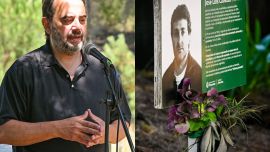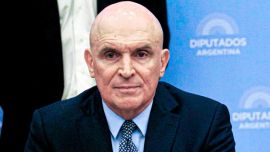Argentina’s government could seal a key trade deal with euro nations before the end of the year – but the agreement won’t be the much-hyped deal with the European Union.
Rather than the high-profile EU-Mercosur deal, which remains stalled after almost two decades of negotiations, diplomats at the Foreign Ministry in Buenos Aires are shifting their focus to finalising a free-trade agreement with the four nations that form the European Free Trade Association (EFTA).
Made up of non-EU states Iceland, Liechtenstein, Norway and Switzerland, the EFTA promotes free trade and economic integration for the benefit of its member states. After the visit of a parliamentary delegation to Argentina and Brazil this week, hopes for a deal with this smaller bloc have been reignited.
At a press briefing in downtown Buenos Aires on Wednesday, Swiss lawmaker Thomas Aeschi (Swiss People's Party), the head of the EFTA delegation, expressed optimism over the likelihood of a quick deal.
He said that officials at the Foreign Ministry had indicated that with the EU deal blocked, there is extra diplomatic scope for focusing on the EFTA deal.
“My personal impression is that Argentina is very willing and very much in favour of a free-trade agreement” with EFTA, said Aeschi.
“I think they realise that on the European Union side for the next couple of months,there will not be too much movement,” he added, saying he expected resources to be shifted to negotiations with EFTA and that the deal could act as a “stepping stone” to the EU deal.
“We firmly believe that a free-trade agreement between our nations would benefit us quite well and we are committed to working towards a successful outcome,” declared Ingibjörg Ólöf Isaksen (Progressive Party), the head of the Icelandic delegation.
Earlier this month, Mercosur and EFTA agreed to relaunch talks over a free-trade agreement between the two blocs. Talks previously had not “formally stopped,” said the delegation, but had “stalled” since the outlines of a deal were agreed in 2018.
A second round of negotiations are scheduled for next month, revealed Aeschi.
Commercial trade between EFTA nations and Mercosur reached US$5.8 billion in 2018, with US$3.7 billion made up of European exports to the South American bloc. By last year, bilateral trade had reached 7.4 billion euros (around US$8 billion).
A few remaining “open points” – which include disagreements on wine, intellectual property rights, sustainability and point of origin issues – are yet to be resolved, added the EFTA delegation chief, who said he expected those issues to be overcome.
“We stressed in our meetings that the EFTA states are less dogmatic and more flexible than the European Union and we’re aiming at finding a solution that suits both negotiating partners,” he said.
The visiting delegation – representing some 14 million inhabitants across four nations – met with lawmakers from the lower house Chamber of Deputies during their stay in Argentina and said the reception had been overwhelmingly positive.
Juliana Santillán (La Libertad Avanza), the vice-president of the lower house’s Foreign Affairs Committee, said in a statement midweek that the deal would increase investment and capital.
Aeschi also stressed the importance of this agreement "as a benefit that encourages investment and the enormous potential for exchange between the two blocs."
The reception in Argentina had been very “encouraging,” agreed Norwegian MP Heidi Norby Lunde (Conservative Party).
Quizzed about the meetings held with Argentine officials while in Buenos Aires, she compared the atmosphere within President Javier Milei’s new administration as reminiscent of her own nation’s 2013 change of government.
“I recognise the feeling of optimism and the will to go forward, trying to implement everything that you have been talking about,” she said.

























Comments